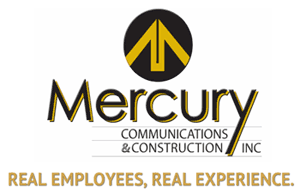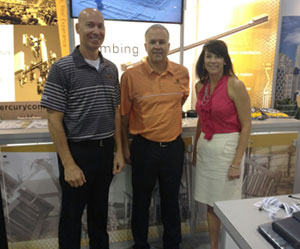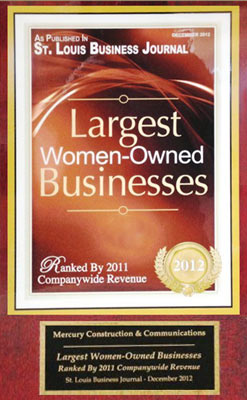TAAC gets results for wireless services provider and general contractor
Jeff Fischer, vice president of Mercury Communications & Construction Inc., Fenton, a wireless services provider and general contractor, and recipient of a $150,000 grant to improve training, marketing and advertising through the Mid-America Trade Adjustment Assistance Center (TAAC), a University of Missouri Extension Business Development Program (BDP) funded by the U.S. Department of Commerce to help manufacturers in Iowa, Kansas, Missouri and Nebraska fight back against foreign competition, estimates he’s been working with one particular Mercury employee for about 25 years now.
“We worked together at McDonald’s a long time ago,” he laughs. “Thirteen years with this company so far.” They get along pretty well, he adds.

Who? His sister, Julie Steis, company president since 2008. Mercury is a true family company; a brother and brother-in-law have also worked for the company, and the firm prides itself on treating employees as family. The ownership shift allowed the firm to be certified as a Woman Business Enterprise, or WBE, with preference for certain private and government projects.
Fischer started the business from the basement of his south St. Louis County condominium after leaving the family construction business in 2000, but having his sister as president just made sense. The federal and state governments both have WBE target goals; AT&T, one of Mercury’s larger customers, is the largest spender of diversity dollars in the country, with contracting goals of 15 percent to minority-owned, 5 percent to women-owned and 2 percent to service disabled veteran-owned firms, worth $15.5 billion in 2013, according to AT&T.

(Left to right) John Maleas, project and tower manager, Jeff Fischer, vice president and Julie Steis, president
Mercury’s fortunes had soared building cellular towers during the tech boom of the early millennium, but nosedived when wireless communications companies halted construction after 9/11. Fischer’s mother helped out with loans to keep the firm going and meet payroll. The firm’s fortunes gradually improved, more so when they became a WBE.
But Fischer still knew Mercury needed a boost, and sought out TAAC.
“We met Ken [Scheve, former TAAC project manager and recipient of the 2014 Missouri Chamber of Commerce and Industry Extension Business Award for exceptional guidance and instruction to Missouri businesses] about a year ago,” Fischer recalls. He was skeptical. “When we first applied for the grant, we did not think we had a chance. And, frankly, anything to do with the government, well, it takes forever.”
That has not been the case at all, he says. “Ken came to visit and he was so positive and gave us some great thoughts on our company and ways to grow based on his experience. Ken pushed us. When something was due, he said, ‘I want it today!’, which was awesome. He stayed very connected, made the process simple.
“TAAC has given us the ability to add great training, improve our marketing and advertising. We are working on several new projects and with Ken’s help, we will be successful.”
Adds controller Bill Magee, who’s worked with Scheve on a near daily basis: “Ken has been fantastic to work with! His help has been very beneficial to Mercury’s success this year.”
One of these successful projects was funding a booth for trade shows at which Mercury showed off a new cell tower design called a trebuchet, not because it can shoot missiles like a medieval trebuchet but because it can swing down from its up to 80 foot height for easy installation or maintenance. Mercury is now setting up a separate division to manufacture the trebuchet pole, innocuous looking enough to be disguised as a light pole, flag pole or telephone pole. Fischer says the buzz the pole unleashed at the show has been priceless.

Mercury has received many honors including the St. Louis Business Journal’s Largest Women-Owned Businesses Award in 2012
Mercury personnel have also installed wireless antenna systems in MU’s newly expanded, SEC-grade Faurot Field. Anyone using a wireless device at a game can thank Mercury.
As the result of these and other measures, Fischer reports that Mercury is having a record year in sales and profit, adding 20 new employees in about a year, bringing the total to about 50. The firm also plans to invest more than $500,000 in new office space, new software, a new system to design smarter cellular towers and a new forklift.
And Fischer says this is just the beginning, as Mercury eyes another potentially lucrative market — Africa. “Africa needs wireless,” he says, and the quickly installed, easily maintained trebuchet pole, backed up by Mercury know-how, could help portions of that continent leapfrog from the agricultural and small-scale manufacturing era straight into the digital era.